Buying a property in France can be an exciting opportunity, whether it’s a holiday home, an investment, or a permanent move. However, the French property buying process is quite different from the system in England and Wales. Understanding how it works , and the role of the Notaire is essential to protect your interests and avoid costly mistakes. Tees’ expert team explain each stage of the process and can help make your purchase as smooth as possible.
Once you have found the property of your dreams, you may decide to make an offer.
If an offer has been agreed, the seller should remove the property from the market and appoint a Notaire to prepare the relevant paperwork.
Stage 1: Getting your Notaire
A Notaire is a French Public Official who ensures that all the documents involved in the transaction are legally in order. One should not assume that a Notaire will carry out the same steps as a solicitor in an English conveyance. Notaires are independent and do not represent either party to the transaction. They make sure that the documents are properly drafted and the relevant taxes are paid. For this reason alone, it is important that you have your own legal adviser to represent your interests so that the documents suit your particular circumstances.
Stage 2: Signing the “Compromis de Vente” or “ Promesse de Vente”
This is the first initial contract prepared by either the estate agent or the Notaire and forms the basis of the purchase. It is important that this document is checked through carefully to ensure that it contains all the relevant clauses to suit your circumstances. If you do not have these special clauses inserted in the contract, you may lose your deposit and incur penalties if you decide to withdraw from the agreement.
Once the contract has been checked through and everything appears to be in order, you will be asked to sign the Compromis and pay a deposit (usually 10%, although this can be less if agreed with the seller). The contract can be signed in this country as it is a document sous seing prive and not authentique.
It is advisable that the deposit is paid to the Notaire rather than the agent. The Notaire will pay the deposit into a designated account in the name of the client and will only release the money to the seller upon agreement from both parties.
The original Compromis you have signed will then be sent to the seller for his signature and a copy of it will then be sent to you. Upon receipt of the copied document, you will have the benefit of a 10 day cooling –off period to change your mind and withdraw from the agreement without having to give any reasons. After this period, if you withdraw from the contract, you will lose your deposit, be compelled to execute the contract and pay the agent’s fees and any damages to the seller.
Stage 3: Pre-completion searches and ownership structure
Once the 10-day cooling-off period has expired, the Notaire will carry out the various searches against the property and obtain any other relevant reports such as termites, asbestos, lead, environmental, gas and electricity but also energy efficiency reports if these have not already been supplied.
The Notaire will also investigate title to the property to ensure that the seller has title to sell and notifies the local authorities of the sale agreed. The local authority has a period of two months from the date of notice within which they must respond. If they fail to respond, it is presumed that the local authority will not exercise their pre-emption rights, and this gives sufficient protection to the buyer. Alternatively, the local authority may simply write to confirm either way.
The results of the various searches together with a draft of the Transfer Deed (acte de Vente) will be sent to you usually around 2 months after signature of the Contract.
Stage 4: Completion
The Notaire will fix a date for completion. This means that both parties should make arrangements to attend the Notaire’s office in person to sign the final Transfer Deed. The buyer should arrange for the balance of the purchase money to be sent to the Notaire, ensure that insurance is in place from the date of completion and notify all the relevant utility companies that they will be the new owner as from the date of completion.
Once the Transfer Deed has been signed (Completion), the Notaire will deal with the stamping and registration formalities and will keep the original deed in his office. The Notaire will only send you a certified copy upon request (“expedition”) or an “Attestation” and this may take several months to come through.
Giving you the full picture
At Tees, we have a team of experts who can review all the legal documents, advise on ownership structure at the time of sale, review wills and put in place UK and French wills. Contact us today for advice.
See our article on French property mortgages for non-residents


